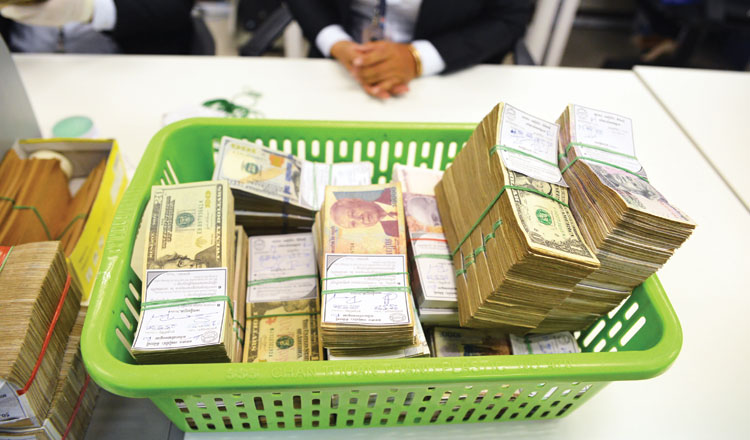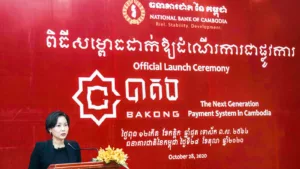‘Riel-ing’ in loans is key to de-dollarisation
The use of the US dollar is a remnant of the Khmer Rouge regime, symbolising the degradation of global confidence in Cambodia’s economic system. It is a daily reminder of the brutality that occurred during the civil war.
“More than economic development, the use of the riel is a matter of our national pride,” said In Channy, chairman of the Association of Banks in Cambodia.
Channy is the founder of ACLEDA Bank Plc. The firm emerged in the post-war period as essentially a nongovernment organisation with support from the International Labour Organization and the UN Development Programme to support micro, small and medium enterprises (MSMEs). It has since grown to be a cornerstone of the economic landscape, becoming the first financial institution listed on the Cambodian Securities Exchange as a commercial bank.
Channy, who said he personally uses the riel more than the dollar, said that usage of the local currency in rural areas is a “key driver” towards de-dollarisation.
According to Channy, ACLEDA is planning on giving preferential rates for loans in riels because it supports the National Bank of Cambodia’s (NBC) mandate to de-dollarise. This would lay the foundation for greater adoption of the currency and bolster the bank’s loan portfolio in local currency.
Currently, some $4.5 billion – 14.18 percent – of ACLEDA’s loan portfolio is in riels, exceeding the NBC’s prakas, which ordered banks to hold at least 10 percent.
“We are a long way from complete de-dollarisation because the NBC has issued three 10-year blueprints towards that goal. The blueprint is reviewed every five years and you will note that the NBC uses terms such as ‘long-term’ or ‘targeted’,” he said.
Noting that taxes already have to be paid in riels, which are popular in the agriculture sector, Channy believes that extending their use in other industries will not only encourage spending, but also demand for loans in local currency.
Channy added that there are three factors needed before the riel can become the sole denomination in Cambodia – sustainable economic growth, a respectable inflation rate and minimal volatility.
The dollar has been volatile since November’s US election. It fell drastically in the weeks following the election of President Joe Biden before experiencing re-inflation. Financial experts said that both were the result of the $1.9 trillion stimulus package put forward by US Democrats.
“The behaviour in the US is to print notes continuously, but Cambodia does not do that. They key to the stability of the riel is actual acceptance and the second is psychological,” Channy said.
He stressed ACLEDA branches, 80 percent of which are in rural areas, see high demand for the riel. Farmers and fisherman favour the currency to purchase seeds, fertiliser and other raw materials for their businesses.
They prefer the riel because of its familiarity (it has Khmer language on it), the ability to replace it if it is torn or otherwise damaged and crucially, because of the high yield it provides for deposits. The demographic would also benefit from preferred interest rates for riel based loans.
ACLEDA is one of the only banks in the Kingdom to allow digital payments in both currencies, which is in step with the NBC’s recently introduced blockchain-based Bakong app.
Bakong allows users to pay or transfer tokenised versions of the riel and dollar. The app is a pioneering move for the Kingdom by introducing regulatory and digital framework supported by the NBC.
Cambodia re-affirmed its commitment to de-dollarisation efforts in tandem with tech innovations by introducing legislation that phased out small denominations of US notes after negotiations with banks and microfinance institutions.
Channy said that digital payments play a “significant role” in adapting to the local currency, a thought echoed by Tomas Pokorny, founding member of PiPay and secretary-general for the Cambodian Association of Finance and Technology.
“Similar to digital, Bakong is an excellent means of execution and one of the many fintech-oriented efforts to help de-dollarise the economy,” said Pokorny.
When asked how digital loans will factor in with de-dollarisation efforts, Pokorny stressed that providing consumers with an option will inevitably expand the usage of the riel.
“Digital consumers are creatures of habit. Even more so, by choice or subconsciously, digital consumers value options. As such, the possibility to transact in dollars or riels leaves a choice for consumers, which makes financial instruments such as loans and Bakong digital tools empowered with the potential to sway the tides once needed,” Pokorny said.
“De-dollarisation will have a positive and micro-impact on the Cambodian economy. However, retention of options in trading dual currencies, especially those pertaining to business-to-business, will remain a critical factor in the Cambodian economy for the foreseeable future. Backed by the stability of the riel, Cambodia is poised to have a strong presence among developing nations as a trading hub for years to come, provided that additional investment and proper policies and schemes are set in place.”
MoneyTransfers.com – a US-based digital remittance transfer service – commissioned a study on countries most likely to support a cashless society. The study found that Asian countries overwhelmingly supported the transition, with India leading the pack. Some 79 percent of Indians surveyed reported that they had “positive feelings towards the motion”.
ASEAN, more than any other economic bloc heavily supported the transition, the survey revealed. MoneyTransfers found that 51 percent of Thais, 65 percent of Malays, 56 percent of Singaporeans, 51 percent of Indonesians, 52 percent of Filipinos and 60 percent of Vietnamese were in favour of moving to cashless societies.
By comparison, Denmark led Western Europe with just 31 percent surveyed reporting that they were supportive, followed by Spain with 24 percent and 26 percent of Brits.
Remi Pell, managing director for fintech firm iPay88, said this was because more established countries had long-lasting relationships with their financial system, whereas Cambodia had more reasons to try new solutions.
“Changing legacy settings in a Western company, such as a banking house might require an investment of millions of dollars while writing off prior capital expenditures, whereas starting a new digital bank that provides lending services in a developing country is a ‘green field’ set-up,” Pell said, who is also Cambodian Association of Finance and Technology chairman.
“A good example of a green field might be Cambodia’s transition from the internet era. People should ask whether there was ever a real boom of dial-up internet and optical broadband here.
“They should contrast this with banking and lending services and consider that a large portion of the population is under-banked so, with the right regulation and arrangements for de-dollarisation, we may see fintech play a large role in the eventuality,” he concluded. Khmer Times







